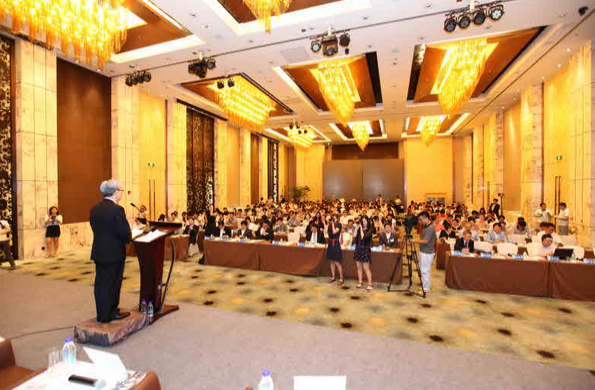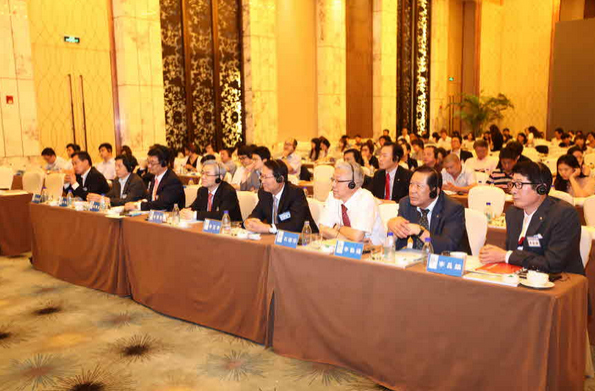30 July (Wed.) South Korea-China Peaceful Unification Forum held in Shanghai, China
30 July (Wed.) South Korea-China Peaceful Unification Forum held in Shanghai, China The 2014 South Korea-China Peaceful Unification Forum themed "Peace and Cooperation in Northeast Asia and Unification of the Korean Peninsula" was held amid the further strengthened bilateral relationship between the two countries following China President Xi Jinping’s official visit to South Korea last July. The purpose of the forum was to study how the two neighboring countries could cooperate in achieving the peaceful unification of the Korean peninsula and enhancing the Chinese people's understanding with regard to the policy of unification and inter-Korean relationship of the South Korean government.
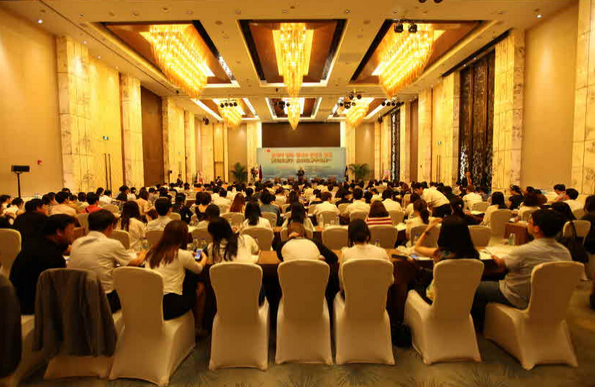
Korea-China Peaceful Unification Forum
At least 15 related experts from South Korea and China discussed the subject of "Peace and Cooperation in Northeast Asia and Peaceful Unification of the Korean Peninsula" and debated on issues such as △ Changing situations in the Korean peninsula and China, △ Evaluation and prospect of the changing national security in Northeast Asia, and △ Future-oriented cooperation between South Korea and China. A total of 300 people attended the forum, including NUAC members in Shanghai, leaders of the Korean Communities in Shanghai, Korean students, Chinese scholars, and college students.
Opening Ceremony
The forum started at 1 pm, kicked off by △ greetings by Park Chan-bong, Secretary General of NUAC. It was followed by △ a welcome speech by Prof. Shi Yuan Hua (石源華) of Pudan Univ. of China as well as △ welcome speeches by Lee Chang-ho, Head of the Shanghai Municipal Chapter of NUAC, Lee Kang-kook, vice consul general of South Korea to Shanghai, and Lee Hoon-bok, Vice-chairperson of the China Assembly of NUAC. The keynote address was given by Shin Jeong-seung, director of the Center for Chinese Studies at Korea National Diplomatic Academy (former South Korean Ambassador to China).
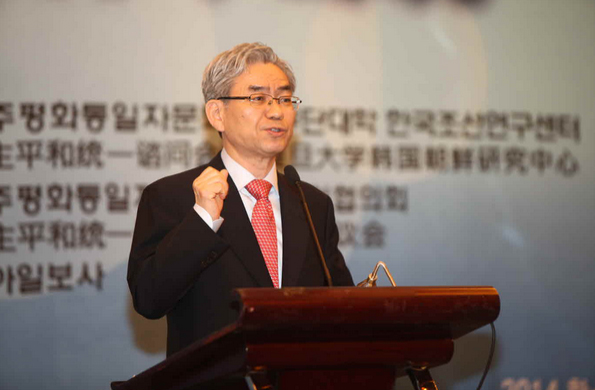
Park Chan-bong, Secretary General of NUAC, giving the opening speech
In his opening speech on the subject of “Roles of China for the Peaceful Unification of the Korean Peninsula,” Park Chan-bong, Secretary General of NUAC, cited the changes of North Korea and the roles of China in achieving the peaceful unification of the Korean peninsula.
"Cooperation between the two countries for the unification of the Korean peninsula and mutual trust with regard to such will be a critical factor in continuing the bilateral relationship between South Korea and China in good faith. The fundamental factor in poverty and prosperity among the countries is whether the market economy system is accepted or not. North Korea can never develop unless Pyeongyang marketizes its economy. Its economic difficulties cannot be solved with partial opening or ceremonial reform; overall structural change into a market economy is the only solution to Pyeongyang’s current economic crisis. Both China and South Korea are responsible for convincing and helping North Korea to join the grand march of prosperity through the overall shift to the market economy system," he added.
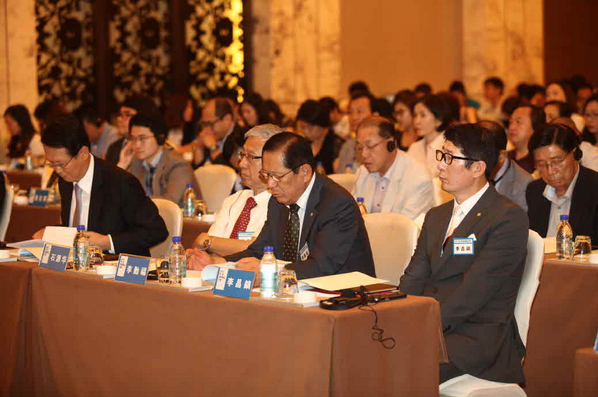
250 people attending the forum
Park also stressed that marketizing the North Korean economy would ease the difference in the economic structures of the two Koreas, which will consolidate the economic communities of the Korean peninsula; thus eventually leading to the peaceful unification of the two Koreas.
The first step toward the peaceful unification of the Korean peninsula is for the North Korean regime to accept the Dresden Plan suggested by President Park Geun-hye.
“The bilateral relationship between Korea and China will be improved dramatically by the peaceful and safe unification of the Korean peninsula, and it will be the cornerstone of peace and prosperity in not only Northeast Asia but also Eurasia," Park said in concluding his opening speech.
On the other hand, in his welcome speech, Prof. Shi Yuan Hua (石源華) of Pudan Univ. of China noted that, as the current relationship between China and South Korea was achieved with efforts, overcoming innate deficiency, the bilateral relationship will continue to be developed and improved. “The Chinese policy toward the Korean peninsula considers the worries of the two Koreas with a balanced viewpoint; at the same time, equal approach to them should be made," he said.
He also cited the need to build economic corridors (path) connecting China and North Korea for the latter to be admitted to international societies, and for a new chapter of regional cooperation in Northeast Asia to start with the Tumen River Development Project.
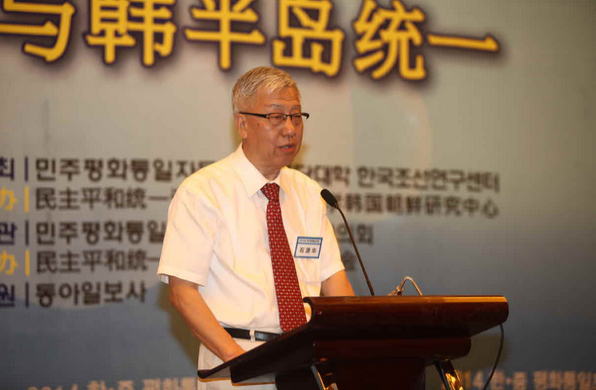
Prof. Shi Yuan Hua (石源華) of Pudan Univ. of China
According to Lee Chang-ho, Head of the Shanghai Municipal Chapter of NUAC, the Asian paradox should be overcome by mutual trust in order for Northeast Asia to be a true community leading global growth. The solid trust between South Korea and China is the core of regional prosperity and development, so active communication and exchange between the peoples of China and South Korea in various fields will be the foundation of building up such trust, he added.
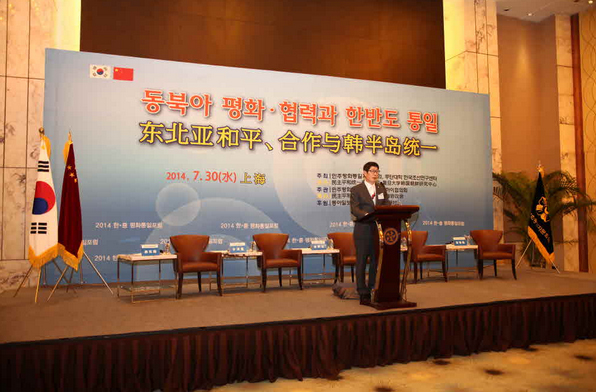
Lee Chang-ho, Head of the Shanghai Municipal Chapter of NUAC
"The appropriateness of the unification of the two Koreas lies in △ overcoming the serious impoverishment in the northern part of the Korean peninsula, △ realizing prosperity in the peninsula, and △ developing the 3 northern provinces of China. Both Koreans and Chinese need to change their perception to achieve the unification of the Korean peninsula, and the genuine cooperation of China for such is absolutely required," said Lee Kang-kook, vice consul general of South Korea.
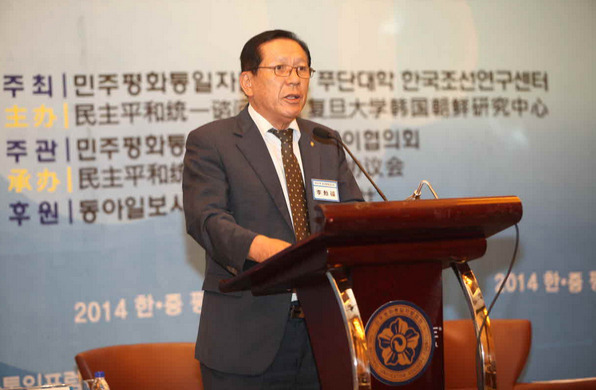
Lee Hoon-bok, Vice-chairperson of the China Assembly of NUAC
Lee Hoon-bok, Vice-chairperson of the China Assembly of NUAC, explained that this kind of forum between South Korea and China is held three times in Shanghai where the Korean fighters for national independence from the Japanese imperialism used to be based. Today when the relationships between South Korea and China, North Korea and China, China and Japan are rapidly changing, this forum is giving many suggestions, he added.
Shin Jeong-seung, director of the Center for Chinese Studies at Korea National Diplomatic Academy (former South Korean Ambassador to China), gave the keynote address under the subject of "Development of Relationships between South Korea and China and Peace on the Korean Peninsula."
"The current relations between China and South Korea are better than ever. Frequent dialogues not only between government levels such as summit talks and foreign ministers but also private sector levels are expanding strategic communications between them. The two countries are cooperating with each other to create a new future and realize joint development under the spirit of mutual respect, response to the signs of the times, advantage of ground, and harmony of the people,” Shin said.
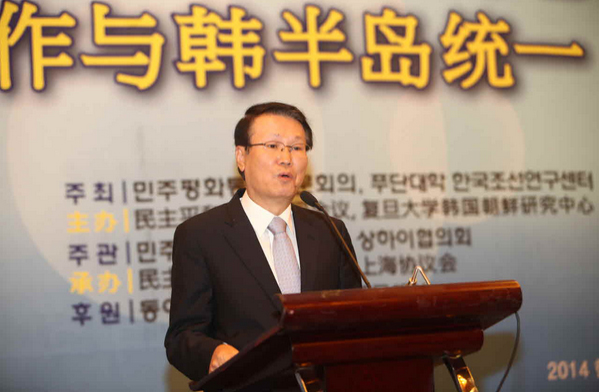
Shin Jeong-seung, director of the Center for Chinese Studies at Korea National Diplomatic Academy
Shin went on to add that China wishes to take the initiative in Asia through the Conference on Interaction and Confidence-Building Measures in Asia (CICA) and establishment of Asia Infrastructure Investment Bank (AIIB), but that such wish may not materialize if those with practically important roles would be excluded from the plan. “America tries to promote the US-Korea alliance to carry global characteristics, whereas China tries to use the partnership with South Korea to achieve its dream of the great revival of the Chinese people. The requirements of the two giants on South Korea will become greater and heavier. Therefore, South Korea should make every effort to achieve peace and prosperity in the region, maintaining balance between the US-South Korea alliance and the strategic partnership with China," he explained.
Shin also emphasized that South Korea does not want the unification of the peninsula by having North Korea absorbed into the South but wishes to establish permanent peace through dialogue and mutual cooperation and eventually achieve peaceful unification when the proper time comes based on mutual agreement between the two Koreas. In this regard, the understanding and support of neighboring countries are essential in promoting the trust-building process of the Korean peninsula, he added.
Session 1: Changing Situation of the Korean Peninsula and China
Session 1 of the forum under the subject of "Changing Situation of the Korean Peninsula and China" was presided over by Prof. Kim Heung-kyu of Ajou Univ. of Korea; the panelists of the session were Park Hyeong-jung, senior researcher of the Korea Institute for National Unification, Prof. Jeong Ji-yong (鄭繼永), manager of the Korea/Chosun Research Center of Pudan Univ. of China, Prof. Hwang Ji-hwan, University of Seoul, and Prof. Kong, assistant manager of the Asia-Pacific Research Center of the Shanghai International Research Institute of China.
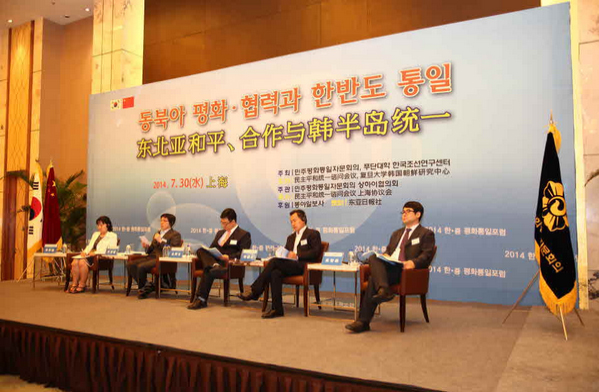
Session 1 panelists: Prof. Kong, Dr. Park Hyung-jung, Prof. Kim Heung-kyu, Prof. Jung Ji-yong, Prof. Hwang Ji-hwan, from left
"Considering the mantra of the Defense Minister of North Korea, Hyun Young-cheol's return to power, and building of the rocket launching base in Dongchang-ri in the North, inter-Korean relations may not improve for the time being despite North Korea's dispatch of athletes to the Asian Games to be held in Incheon, South Korea. If North Korea proceeds with its 4th nuclear test and launches its pilot long-range missile, the situation surrounding the Korean Peninsula will change rapidly," said senior researcher Park Hyung-jung.
According to Prof. Jung of Pudan Univ. of China, on the occasion of purging Jang Sung-taek, the former no. 2 in the power hierarchy of North Korea, the Kim Jung-eun regime seems to have stabilized. “We cannot find any sign of rapid change and chaos in the areas of politics, economy, and society of North Korea," he added.
Prof. Jung also said that the Chinese policy toward North Korea might face some difficulties due to China President Xi Jinping's visit to South Korea, but that the mainstream of Chinese policy for the Korean peninsula has not changed. The visit to South Korea by President Xi prior to his possible visit to North Korea does not mean that the Chinese policy for Korea gives priority or more weight to the South.
"The so-called 'Parallel Advancement in Economy and Developing Nuclear Power' of North Korea is a contradictory theory with structural problems. The economic development of North Korea will most likely fail because international societies would be reluctant to invest in North Korea unless Pyeongyang abandons its nukes. Meanwhile, the increased and excessive dependence of North Korea on China is not desirable because such will eventually lead to the increased influence of China on the entire Korean peninsula," Prof. Hwang Ji-hwan of the Univ. of Seoul, Korea explained.
Prof. Kong of the Shanghai International Research Institute noted that China will continue endeavoring to connect North and South for their communication and dialogue even though the current situation between the two Koreas is very difficult. “Some people cite the possibility of a China-South Korea Alliance, but it is neither desirable nor practically possible. North Korean issues including nuclear weapons should be solved by a 6-party talk or by the initiative of Washington and Beijing," he stressed.
Session 2: Evaluation and Prospect of Changes in the National Security Structures in Northeast Asia
Session 2 of the forum, themed "Evaluation and Prospect of Changes in the National Security Structures in Northeast Asia," was presided over by Chen Dong Xiao (陳東曉), director of the Shanghai International Research Institute. The panelists of the session were Prof. Han Seok-hee, International Graduate School of Yonsei Univ. of Korea, Prof. Chen Ding Li (沈丁立) of Pudan Univ. of China, Jin Chang-soo, director of the Japan Research Center of Sejong Institute, and Prof. Xia Li Ping (夏立平), director of the International Politics and Relation Institute of Tungji Univ. of China.
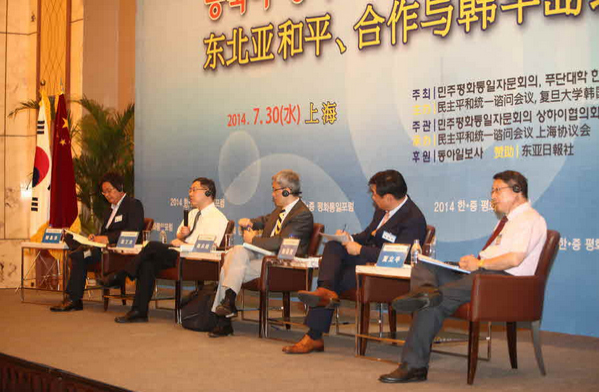
Session 2 Panelists: Dr. Jin Chang-soo, Prof. Chen Ding Li, Director Chen Dong Xiao, Prof. Han Suk-hee, and Director xia li ping
According to Prof. Han of Yonsei Univ. of Korea, raising China and recessing America serve as important factors in the current changes in security in Northeast Asia. Changes and confrontation structures among South Korea, USA and Japan on one hand with North Korea, China, and Russia on the other are reorganizing themselves. “The conflict between China and Japan, antagonism between South Korea and Japan, nuke test by North Korea, and China keeping its distance from North Korea act as an unstable element of security in the region; the basic frame centered on the USA may continue for the time being, and fundamental changes cannot be expected," he explained.
Prof. Chen Ding Li of Pudan Univ. of China noted that, since the national power of China has been raised remarkably, China and America are sometimes competing for the initiatives of security in the region but acknowledge each other’s rights. The two super powers have been trying not to exacerbate the situation. The security of the Korean peninsula should be understood under such context and frame, he added.
"Nowadays, Japan tries to strengthen the US-Japan alliance and, at the same time, intends to build a blockade surrounding China together with Australia, India, and Russia. Modernizing and improving the Japanese military forces and facilities may prove to be another unstable factor to the regional security in Northeast Asia. South Korea should play the role of alleviating the Asian paradox to stabilize security and order in the region while broadening its options by institutionalizing the consultative body among the countries," said Jin Chang-soo, Director of the Japan Research Center of the Sejong Institute of Korea.
Xia Li Ping, director of the International Relation Institute, believes that China will pursue its policy blended with realism and idealism but will never pursue its own interest beyond the UN Charter. Since it is necessary to curb the USA so that it does not control the Asia-Pacific regions unfairly, joint control of the regions by China and America is desirable. President Xi visiting South Korea first means that the past special relationship between China and North Korea has been downgraded to a normal one. It suggests that Beijing may put relative priority to South Korea while implementing its policy for the Korean Peninsula, he added.
Session 3: Future-Oriented Cooperation between Korea and China
Session 3 was presided over by Prof. Moon Heung-ho of Hanyang Univ. of Korea, with the following serving as panelists: Prof. Lee Hee-ok, dean of the Graduate School of Sungkyunkwan Univ. of Korea; Prof. Lun Shao (任曉) of Pudan Univ. of China; Bang Hyung-nam, editor of the Dong-A Ilbo of Korea, and; Ryu Ming (劉鳴), deputy director of the International Research Institute of Shanghai Social Academy of China.
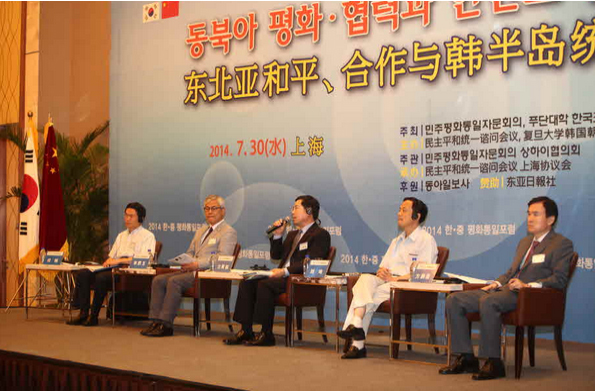
Session 3 panelists: Prof. Ren Xiao, Prof. Lee Hee-ok, Prof. Moon Heung-ho, Deputy Director Liu Ming, and Bang Hyung-nam, editor of the Dong-a Ilbo
According to Prof. Lee Hee-ok of Sungkyungkwan Univ., the relationship between China and Japan should be studied carefully in building a new relationship between Korea and China; joint interest should be pursued starting from the common interest between the two countries, and strategic conversation between Korea and China should be strengthened further. Beyond the simple exchange of people and culture between them, new exchange of humanity is required, he stressed.
"President Xi's visit to South Korea indicates the increased importance of South Korea from the viewpoint of Chinese external relations. It may imply that North Korea is losing a good opportunity. China does not agree with the concept of G2 suggested by Korea, and a substantial level of cooperation and competition coexists between China and America, which will last for a long time. Building strategic trust may take time," said Prof. Ren Xiao of Pudan Univ. of China.
Bang Hyung-nam, editor of the Dong-A Ilbo of Korea, believes that President Xi's visit to South Korea sends a very strong message to North Korea, and that the future relationship between China and North Korea depends on how the message is interpreted by North Korea. “South Korea's selection of either China or USA, both of which maintain close relations with South Korea in the aspect of national security and economy, is premature. South Korea should convince America while China brings North Korea in to solve the latter’s nuclear issue so as to create a frame of dialogue among South and North Korea, America, and China," he added.
According to Prof. Liu Ming of Shanghai Social Science Academy, the most serious factor of uncertainty in the relationship between China and South Korea is the nuclear issue of North Korea. “South Korea expects the decisive role of China in solving the issue, but the influence of China on North Korea is limited, and Beijing is not in a position to force Pyeongyang to take any of the options we want. As far as the nuclear issue of North Korea is concerned, instead of taking measures after the crisis occurs, we need to alleviate the problems by intervening in advance through dialogue," he stressed.
The attendees in the forum voiced their opinions actively. They asked the panelists various questions such as development of the relationship between South Korea and China, reality of North Korea and possibility of change, relationship between South Korea and China after the Korean peninsula is unified, and security issue of Northeast Asia.
The forum continued for 5 hours and 30 minutes, providing a good opportunity to enhance understanding of the main issues related to the unification of the Korean peninsula, international situation surrounding Northeast Asia, and sharing of the hope and dream of peace and prosperity between South Korea and China in Northeast Asia focused on a unified Korean peninsula.










